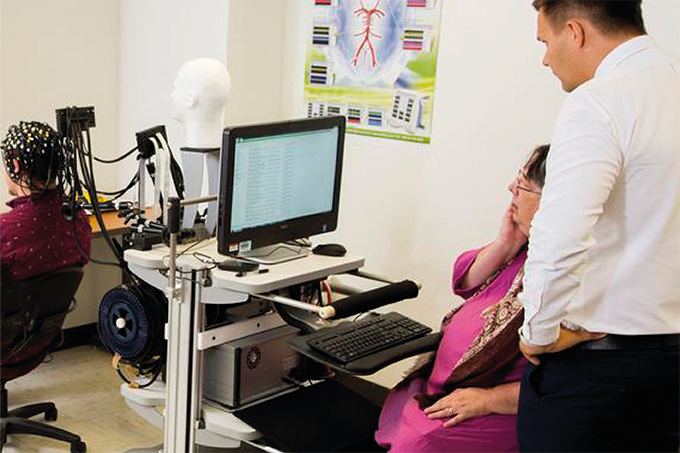
Credit: University of Oklahoma
Researchers have identified key biomarkers of mild cognitive impairment (MCI) – considered an early stage of cognitive decline and a precursor to conditions such as Alzheimer’s disease – involving neurovascular coupling (NVC), functional connectivity (FC), and cerebrovascular endothelial extracellular vesicles (CEEVs). The study highlights these changes as potential diagnostic tools for detecting early stages of cognitive decline.
Using a combination of functional near-infrared spectroscopy (fNIRS) and flow cytometry, the study examined how brain function and cerebrovascular health differ between individuals with MCI and healthy controls.
The research centered on neurovascular coupling, a process that links neuronal activity to changes in cerebral blood flow, a key factor in maintaining cognitive function. Researchers found that NVC responses in the left dorsolateral prefrontal cortex (LDLPFC), a critical brain region for working memory, were significantly impaired in participants with MCI compared to controls. These impairments were associated with decreased blood flow and diminished functional connectivity in the brain, suggesting that these markers could help differentiate between healthy aging and MCI.
Additionally, the study focused on CEEVs – extracellular vesicles released by the cerebrovascular endothelium. These vesicles were found in higher concentrations in individuals with MCI, and their levels correlated with small vessel ischemic damage in the brain, measured via MRI. The presence of these vesicles suggests that they could serve as biomarkers for cerebrovascular pathology and cognitive decline.
"Every brain is different, and there may be differing reasons for cognitive impairment, but having these predictors – measuring neurovascular coupling, functional connectivity, and CEEVs – potentially opens opportunities to develop individualized interventions, whether it's a pharmacological therapy or non-invasive brain stimulation, or something as simple as cognitive behavioral therapy," said Andriy Yabluchanskiy, OU College of Medicine associate professor of neurosurgery and co-author of the study, in a press release.
Researchers employed a machine-learning model to classify MCI using a combination of these factors – NVC, FC, and CEEV concentration. The model demonstrated an 85 percent accuracy rate, highlighting the potential of these biomarkers in early diagnosis.
The researchers are in year two of a four year study.
